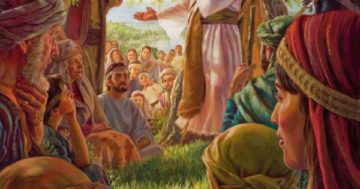Franciscan Friar Fr. Paul Gallagher reflects on the Gospel for the Twenty-third Sunday of Ordinary Time, August 21, 2022. The content is edited by Franciscan Sister of Christian Charity Sister Anne Marie Lom and Joe Thiel. The excerpts from the Sunday readings are prepared by Joe Thiel. To read or download the complete pdf with excerpts for your prayer, please click here: Franciscan Gospel Reflection September 4 2022. Excerpts are from the Lectionary for Mass for Use in the Dioceses of the United States of America, second typical edition © 2001, 1998, 1997, 1986, 1970 Confraternity of Christian Doctrine, Inc., Washington, DC. Used with permission. All rights reserved. No portion of this text may be reproduced by any means without permission in writing from the copyright owner. Photo: [[File:DSC00659 – Simon of Cyrene helps Jesus carry the cross (48167962917).jpg|DSC00659 – Simon of Cyrene helps Jesus carry the cross (48167962917)]]
Luke 14:25-33
 Great crowds were traveling with Jesus, and he turned and addressed them, “If anyone comes to me without hating his father and mother, wife and children, brothers and sisters, and even his own life, he cannot be my disciple. Whoever does not carry his own cross and come after me cannot be my disciple.
Great crowds were traveling with Jesus, and he turned and addressed them, “If anyone comes to me without hating his father and mother, wife and children, brothers and sisters, and even his own life, he cannot be my disciple. Whoever does not carry his own cross and come after me cannot be my disciple.
“Which of you wishing to construct a tower does not first sit down and calculate the cost to see if there is enough for its completion? Otherwise, after laying the foundation and finding himself unable to finish the work the onlookers should laugh at him and say, ‘This one began to build but did not have the resources to finish.’
“Or what king marching into battle would not first sit down and decide whether with ten thousand troops he can successfully oppose another king advancing upon him with twenty thousand troops? But if not, while he is still far away, he will send a delegation to ask for peace terms.
“In the same way anyone of you who does not renounce all his possessions cannot be my disciple.”
Background:
Last week’s gospel (Luke 14:1, 7-14) placed Jesus at table with a leading member of the Pharisees for a Sabbath meal. The custom of the day would have been to place the most honored guests at the right and the left of the host. But all at the table would have been people of similar status. Jesus challenged those attending the meal to rethink how to gain honor. That text concluded with the reassuring statement that all will be “repaid at the resurrection of the righteous.” (Luke 14:14)
Not included as part of last Sunday’s gospel is a comment made by one of the other dinner guests: “Blessed is the one who will dine in the kingdom of God.” (Luke 14:15b) In response, Jesus tells another parable with the familiar theme of a great banquet. Many of the invited declined to attend, so the “poor and the crippled, the blind and the lame” were invited. (Luke 14:21d) Because there was still room, even the strangers along the road were invited.
Luke’s gospel then describes Jesus addressing a great crowd that has been traveling with him, which is the text for this week’s gospel. But Luke will return to the image of a great banquet next week when Jesus tells the parable of the prodigal son.
 As Jesus addresses the crowd in this week’s gospel, his focus is on those who might consider becoming one of his disciples. In what may be startling language, he describes three qualities: the ability to put their relationship to Jesus above other relationships, acceptance of the cross, and letting go of possessions. In a cultural world where one’s relationship with family and community determined every aspect of life including even survival, making one’s relationship with Jesus the first and primary relationship carried significant repercussions. Jesus’ commitment to his mission meant a willingness to accept suffering and death. His followers needed to be aware that their commitment could require them to experience suffering and rejection also. Lastly, Jesus’ disciples must be willing to let go of their possessions as faithful disciples. This is not a new requirement, but it follows for the others.
As Jesus addresses the crowd in this week’s gospel, his focus is on those who might consider becoming one of his disciples. In what may be startling language, he describes three qualities: the ability to put their relationship to Jesus above other relationships, acceptance of the cross, and letting go of possessions. In a cultural world where one’s relationship with family and community determined every aspect of life including even survival, making one’s relationship with Jesus the first and primary relationship carried significant repercussions. Jesus’ commitment to his mission meant a willingness to accept suffering and death. His followers needed to be aware that their commitment could require them to experience suffering and rejection also. Lastly, Jesus’ disciples must be willing to let go of their possessions as faithful disciples. This is not a new requirement, but it follows for the others.
Jesus is speaking to the crowds here, not to his disciples. Especially from the two short parables, one gets the sense that he is addressing those in the crowd who are contemplating becoming his disciples. He wants them to know the significance of the decision before them, and not make it without careful consideration.
Reflection Questions:
- Can you recall a situation when found yourself wishing that you knew more fully what getting involved in a project was really going to involve?
- Who have been the people who have mentored and guided you through some of the important decisions you have had to make?
- During difficult or important decisions, were there also voices of advice that were not truly helpful? Can you identify any common qualities about their motives or the advice they tried to offer?
- Do you have any heroes among those who have stood up for what they believed to be right in difficult situations?
- What are some of the things you have had to “leave behind” or “let go of” in order to do what you needed to as a disciple of Jesus?
- What does it say to you that Jesus wanted those who were considering discipleship to consider the consequences of their actions?
- Can you share honestly and openly with God your feelings about trying to live as a disciple of Jesus, or some other aspect of today’s gospel that is important to you?


